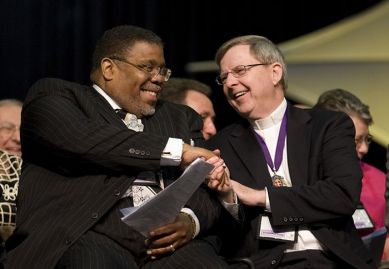Pan-Methodist Vote Could Open New Relationships Among churches

A vote by United Church Methodist Church delegates at an annual conference starting next week could open the way to full communion among six Methodist denominations historically separated by race, opening up a new range of relationships.
The vote during the 2012 UMC General Conference which goes from April 24 to May 4 will formalize much work already being done among several churches.
"Much of what the full communion agreement entails has already been implemented," said Rev. Stephen J. Sidorak Jr. top executive of the United Methodist Commission on Christian Unity and Interreligious Concerns, according to the United Methodist News Service.
He said the result of implementation will be "a new range of relationships among the churches of the Pan-Methodist Commission" that will allow it to "live into its full potential."
The resolution to be voted on will bring the UMC into full communion with the African Methodist Episcopal Church, the African Methodist Episcopal Zion Church, the African Union Methodist Protestant Church, the Christian Methodist Episcopal Church, the Union American Methodist Episcopal Church.
The resolution affirms that "Jesus Christ calls us to unity so that the world may believe." It also states the churches share a common heritage of faith and commitment to mission.
It notes that in 2000, the UMC apologized through an Act of Repentance about "the injury it inflicted on its African American brothers and sisters through its racist position and policies that led to the formation of the historically African American Methodist churches."
The resolution states that upon an affirmative vote, the churches will:
1) recognize in one another the one, holy, catholic, and apostolic faith as it is expressed in the Scriptures, confessed in the Church's historic creeds, and attested to in the common doctrinal standards of the six churches;
2) recognize the authenticity of each other's Baptism and Eucharist, and extend sacramental hospitality to one another's members;
3) recognize the validity of our respective ministries, including: each other's ordination of persons to the Ministry of Word and Sacrament; the authentic diaconal service of deaconesses, home missioners, and ordained deacons in the six churches; and each other's polity and ministries of oversight (including the interpretation of church doctrines, discipline of members, authorization of persons for ordained and lay ministries, and provision for administrative functions);
4) recognize the full interchangeability and reciprocity of all ordained ministers of Word and Sacrament, subject to the constitutionally approved invitation for ministry in each other's churches;
5) applaud one another's ecumenical conversations with other church bodies acknowledging that each church remains free to pursue additional full communion agreements as each deems appropriate, so that the world may believe.